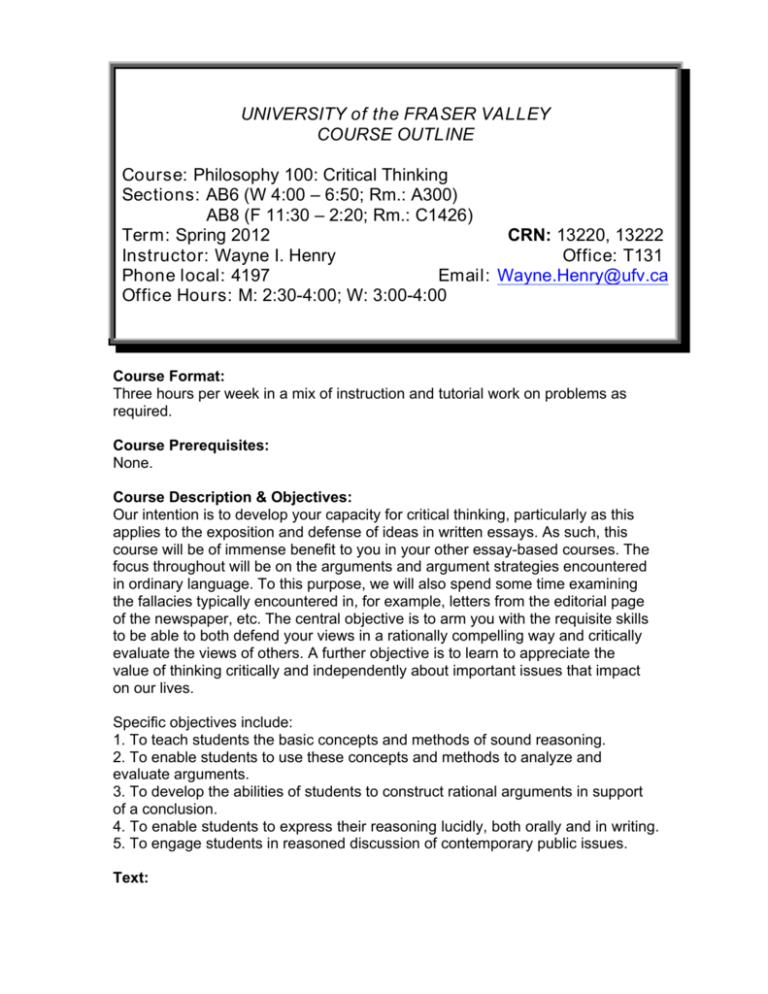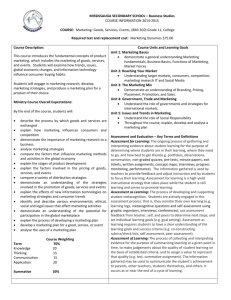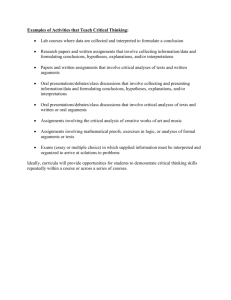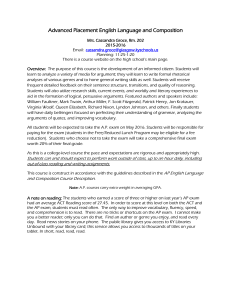PHIL 100.AB6 & AB8 Winter 2012 Wayne Henry
advertisement

UNIVERSITY of the FRASER VALLEY COURSE OUTLINE Course: Philosophy 100: Critical Thinking Sections: AB6 (W 4:00 – 6:50; Rm.: A300) AB8 (F 11:30 – 2:20; Rm.: C1426) Term: Spring 2012 CRN: 13220, 13222 Instructor: Wayne I. Henry Office: T131 Phone local: 4197 Email: Wayne.Henry@ufv.ca Office Hours: M: 2:30-4:00; W: 3:00-4:00 Course Format: Three hours per week in a mix of instruction and tutorial work on problems as required. Course Prerequisites: None. Course Description & Objectives: Our intention is to develop your capacity for critical thinking, particularly as this applies to the exposition and defense of ideas in written essays. As such, this course will be of immense benefit to you in your other essay-based courses. The focus throughout will be on the arguments and argument strategies encountered in ordinary language. To this purpose, we will also spend some time examining the fallacies typically encountered in, for example, letters from the editorial page of the newspaper, etc. The central objective is to arm you with the requisite skills to be able to both defend your views in a rationally compelling way and critically evaluate the views of others. A further objective is to learn to appreciate the value of thinking critically and independently about important issues that impact on our lives. Specific objectives include: 1. To teach students the basic concepts and methods of sound reasoning. 2. To enable students to use these concepts and methods to analyze and evaluate arguments. 3. To develop the abilities of students to construct rational arguments in support of a conclusion. 4. To enable students to express their reasoning lucidly, both orally and in writing. 5. To engage students in reasoned discussion of contemporary public issues. Text: 2 William Hughes & Jonathan Lavery (2008) Critical Thinking: An Introduction to the Basic Skills. Toronto: Broadview Press. Course Requirements: • Three take home assignments worth 15% each. o Note: I do not accept emailed assignments; hard copies only. o In addition, I do not accept late assignments as I distribute the answers the day the assignments are due. • A single mid-term worth 25%. • A final exam worth 30%. Grading Profile: • A+ 87-100 • A 84-86 • A80-83 • B+ 77-79 • B 74-76 • B70-73 • C+ 67-69 • C 64-66 • C60-63 • D 50-59 • F 0-49 SYLLABUS: WEEK 1: • Arguments: premises and conclusions; argument strategies: deductive and inductive; logic and critical thinking [Text - Ch.1] WEEK 2: • How to recognize arguments [Text - Ch.1] • Distinguishing arguments from explanations [Text - Ch.1] • The concepts of logical strength & cogency [Text - Ch.1] • Meaning and definition [Text - Ch.2] WEEK 3: • Meaning and definition, continued [Text - Ch.2] Ø Assignment #1 distributed (CH.’s 1 & 2) WEEK 4: • Clarifying meaning [Text - Ch.3] 3 WEEK 5: • Reconstructing arguments [Text - Ch.4] • Clinic on reconstructing arguments WEEK 6: • An introduction to the assessment of arguments [Text – Ch.5] Ø Assignment #2 distributed (CH.’s 3 & 4) WEEK 7: Ø Mid-term (CH.’s 1 – 4) WEEK 8: • Assessing truth [Text - Ch.6] WEEK 9: • Assessing relevance [Text - Ch.7] WEEK 10: • Assessing adequacy [Text – Ch.8] Ø Assignment #3 distributed (CH.’s 5 – 8) WEEK 11: • Deductive reasoning [Text - Ch.9] WEEK 12: • Deductive reasoning - continued [Text - Ch.9] • Inductive reasoning [Text - Ch.10] WEEK 13: • Inductive reasoning - continued [Text - Ch.10] • Summing up, review and preparation for final test Ø This schedule is flexible and will be amended as required. NOTE: It is the responsibility of the student to keep abreast of the readings (that is the point of the syllabus) and, if absent, to secure class notes from another student. These materials are not easy to read and, thus, you must leave ample time for the task. The committed student will have read the assigned material (more than once) before the class in which it is to be discussed and will reread the assigned readings immediately after the class discussion. As well, a committed student will ensure that their essays or other homework assignments are begun well before the due date. A good essay will require, at a minimum, 4-6 hours to produce an outline and first draft, and about an equal amount of time to adequately revise and produce the final version to be submitted. I am happy to read early drafts and outlines, but I am quite a bit less willing to do this the day before the essay is due. Essay topics are distributed well in advance of the due date for just this reason. 4 POLICIES: University of the Fraser Valley has policies on Academic Appeals (including appeal of final grades), Student Conduct, Cheating and Plagiarism, Academic Probation and other educational issues. Copies of these and other policies are distributed to all students during the registration process and are also available in the University Calendar and in the Library. Following are some specific items I wish to draw to your attention: Respect in the Classroom: I strive to create an environment of mutual respect for all participants in the classroom so they can feel comfortable contributing to the class discussions and so on. The standard rules of courtesy apply here, but this is one I insist upon: all cell phones are shut off while in the classroom. No exceptions! Absenteeism: Regular attendance is a requirement of this course. All missed classes will require documentation. A student that is absent for four classes (i.e., more than three classes) and, thus, not adequately participating in class will not be permitted to write the final exam, even with documentation. For similar reasons, I will not accept submitted work from those who are absent for four classes. Missed Assignments: There is no provision for make-up assignments. Thus, students lose the portion of the grade associated with any missed work. Late Assignments: Late assignments are not accepted except at the instructor’s discretion in cases of illness or bereavement. Documentation will be required. “I” Grade: Not normally given. Class Participation: The grade for class participation is based on both the frequency and the quality of the student’s comments, questions and observations, with the emphasis on quality. The quality is determined by, among other things, the relevance, insight and clarity of remarks. 5 English Usage: Proper English usage is essential to the enterprise of presenting and defending one’s ideas; if the instructor cannot understand what the student is trying to say, it is impossible to evaluate the student’s work. Thus, any submitted work that is seriously grammatically flawed will be returned unmarked, and the student will be required to resubmit the work for evaluation with a penalty of five points. This offer will not apply to final term essays or assignments which will be given a mark of zero. If it is anticipated that there will be problems meeting this requirement, it is incumbent on the student to seek help from, for example, the Writing Centre on campus. Plagiarism and Cheating: Plagiarism is the deliberate presentation or submission of the research, work, ideas, illustrations or diagrams of others as one’s own without citation or credit. Cheating includes the use of unauthorized aids, assistance or materials in the preparation of assignments or in examinations. During examinations, it is considered cheating to communicate with others to obtain information, to copy from the work of others, or to deliberately expose or convey information to others. The resubmission of one’s own work for which credit has already been granted in another course, without the instructor’s permission, is also cheating. Penalties for academic dishonesty may include a grade of zero on the examination or assignment, a failing grade for the course, suspension from the university, or expulsion from the university. Office Consultation: My official office hours will be at the top of the first page of this outline. However, you can consider me to be available to help you whenever I am on campus. This means you can feel free to visit me at my office at any time, or approach me at any time and any place. If I am busy or for some reason unable to help you at that moment, we will schedule a time that is convenient for both of us. As a matter of personal preference, I think it’s much more civil to have discussions over a cup of coffee and I can often be found in the cafeteria. Should you see me there, please feel free to join me to discuss the course, or anything else for that matter. I am also available by email, but please allow up to two working days for a response.







